Developing Effective Management Solutions
VerifiedAdded on 2020/09/17
|15
|4504
|38
AI Summary
This assignment focuses on the responsibility of managers to increase their efficiency and that of their employees, allowing for relevant outcomes. It emphasizes the need for adopting innovative technology to train line managers to cope with new challenges and implement new methods to resolve them.
Contribute Materials
Your contribution can guide someone’s learning journey. Share your
documents today.
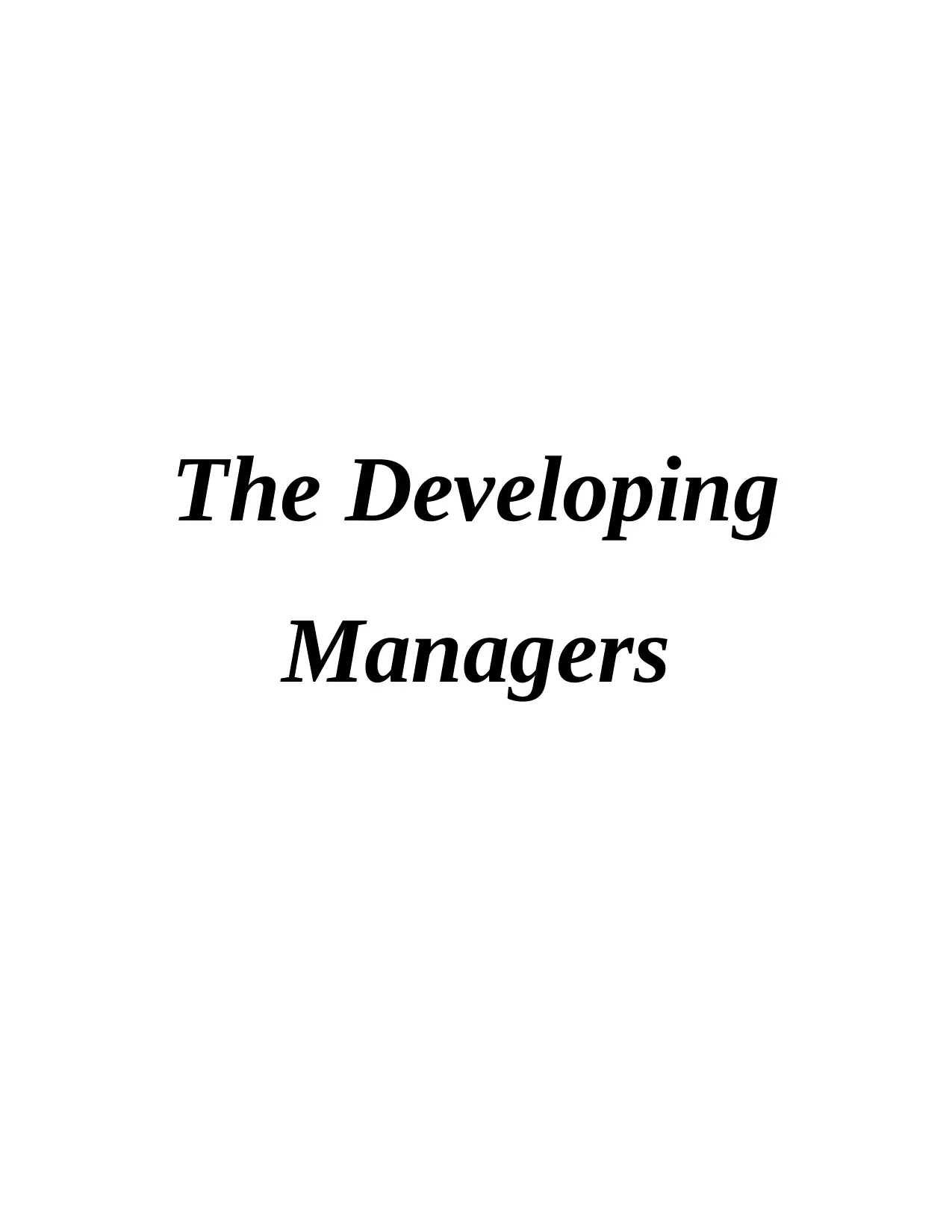
The Developing
Managers
Managers
Secure Best Marks with AI Grader
Need help grading? Try our AI Grader for instant feedback on your assignments.
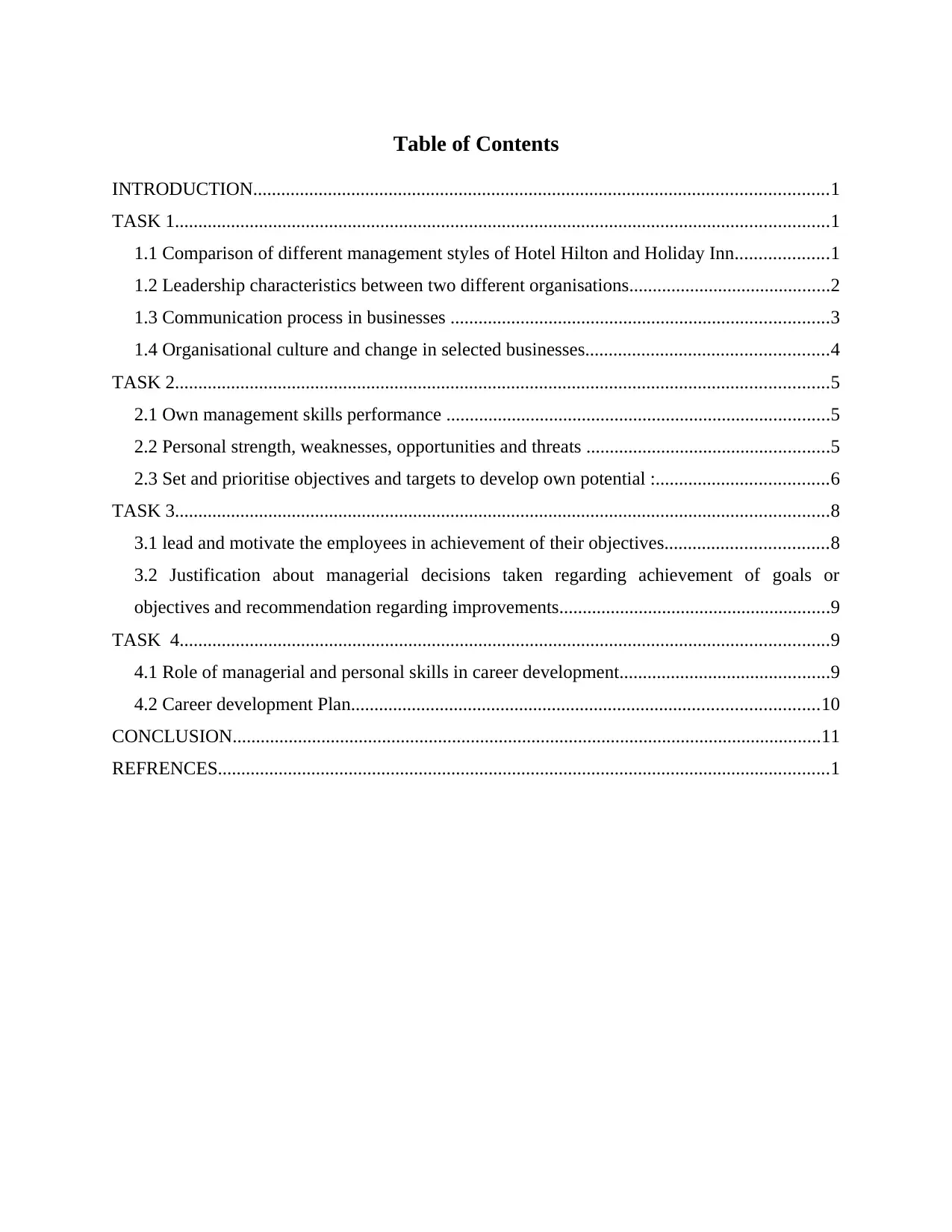
Table of Contents
INTRODUCTION...........................................................................................................................1
TASK 1............................................................................................................................................1
1.1 Comparison of different management styles of Hotel Hilton and Holiday Inn....................1
1.2 Leadership characteristics between two different organisations...........................................2
1.3 Communication process in businesses .................................................................................3
1.4 Organisational culture and change in selected businesses....................................................4
TASK 2............................................................................................................................................5
2.1 Own management skills performance ..................................................................................5
2.2 Personal strength, weaknesses, opportunities and threats ....................................................5
2.3 Set and prioritise objectives and targets to develop own potential :.....................................6
TASK 3............................................................................................................................................8
3.1 lead and motivate the employees in achievement of their objectives...................................8
3.2 Justification about managerial decisions taken regarding achievement of goals or
objectives and recommendation regarding improvements..........................................................9
TASK 4...........................................................................................................................................9
4.1 Role of managerial and personal skills in career development.............................................9
4.2 Career development Plan....................................................................................................10
CONCLUSION..............................................................................................................................11
REFRENCES...................................................................................................................................1
INTRODUCTION...........................................................................................................................1
TASK 1............................................................................................................................................1
1.1 Comparison of different management styles of Hotel Hilton and Holiday Inn....................1
1.2 Leadership characteristics between two different organisations...........................................2
1.3 Communication process in businesses .................................................................................3
1.4 Organisational culture and change in selected businesses....................................................4
TASK 2............................................................................................................................................5
2.1 Own management skills performance ..................................................................................5
2.2 Personal strength, weaknesses, opportunities and threats ....................................................5
2.3 Set and prioritise objectives and targets to develop own potential :.....................................6
TASK 3............................................................................................................................................8
3.1 lead and motivate the employees in achievement of their objectives...................................8
3.2 Justification about managerial decisions taken regarding achievement of goals or
objectives and recommendation regarding improvements..........................................................9
TASK 4...........................................................................................................................................9
4.1 Role of managerial and personal skills in career development.............................................9
4.2 Career development Plan....................................................................................................10
CONCLUSION..............................................................................................................................11
REFRENCES...................................................................................................................................1

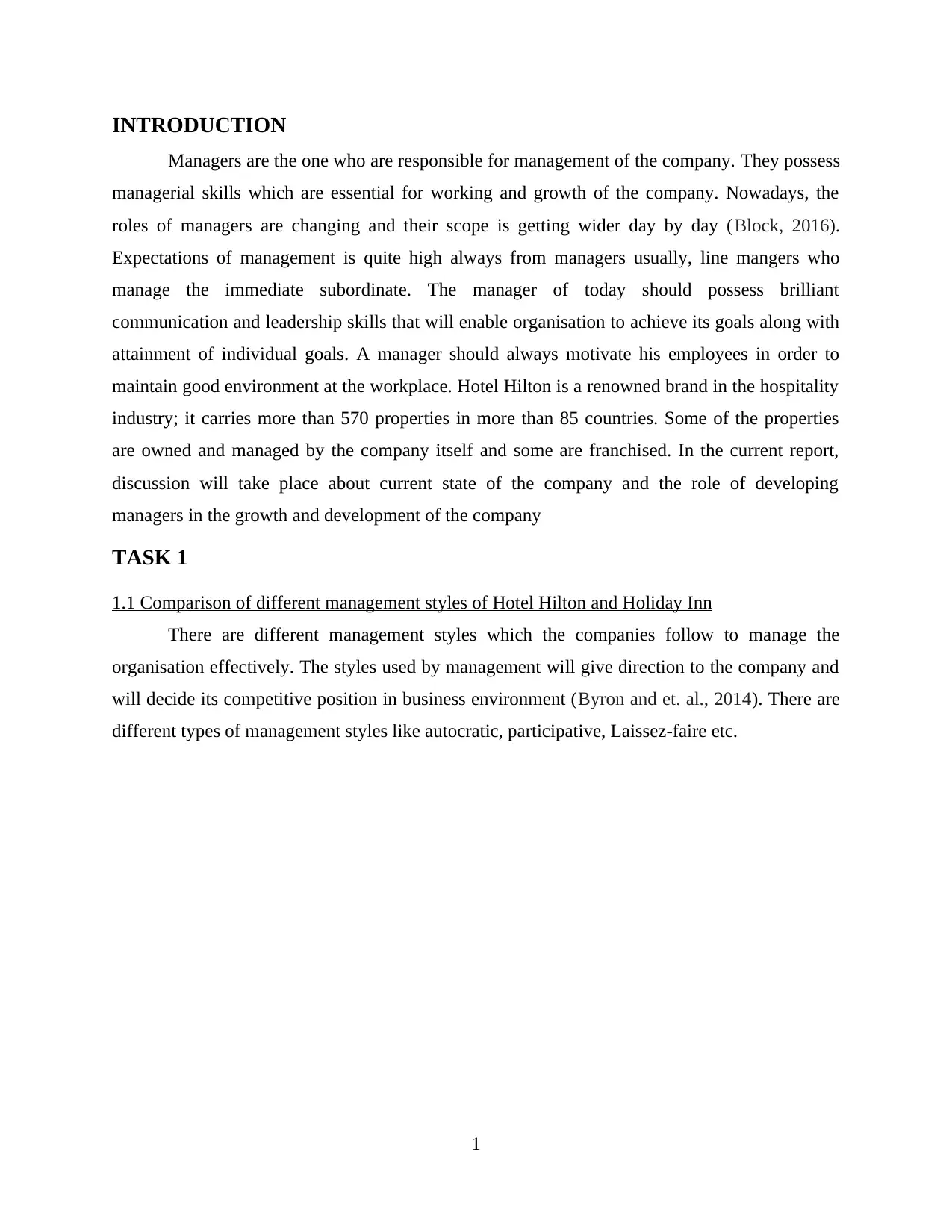
INTRODUCTION
Managers are the one who are responsible for management of the company. They possess
managerial skills which are essential for working and growth of the company. Nowadays, the
roles of managers are changing and their scope is getting wider day by day (Block, 2016).
Expectations of management is quite high always from managers usually, line mangers who
manage the immediate subordinate. The manager of today should possess brilliant
communication and leadership skills that will enable organisation to achieve its goals along with
attainment of individual goals. A manager should always motivate his employees in order to
maintain good environment at the workplace. Hotel Hilton is a renowned brand in the hospitality
industry; it carries more than 570 properties in more than 85 countries. Some of the properties
are owned and managed by the company itself and some are franchised. In the current report,
discussion will take place about current state of the company and the role of developing
managers in the growth and development of the company
TASK 1
1.1 Comparison of different management styles of Hotel Hilton and Holiday Inn
There are different management styles which the companies follow to manage the
organisation effectively. The styles used by management will give direction to the company and
will decide its competitive position in business environment (Byron and et. al., 2014). There are
different types of management styles like autocratic, participative, Laissez-faire etc.
1
Managers are the one who are responsible for management of the company. They possess
managerial skills which are essential for working and growth of the company. Nowadays, the
roles of managers are changing and their scope is getting wider day by day (Block, 2016).
Expectations of management is quite high always from managers usually, line mangers who
manage the immediate subordinate. The manager of today should possess brilliant
communication and leadership skills that will enable organisation to achieve its goals along with
attainment of individual goals. A manager should always motivate his employees in order to
maintain good environment at the workplace. Hotel Hilton is a renowned brand in the hospitality
industry; it carries more than 570 properties in more than 85 countries. Some of the properties
are owned and managed by the company itself and some are franchised. In the current report,
discussion will take place about current state of the company and the role of developing
managers in the growth and development of the company
TASK 1
1.1 Comparison of different management styles of Hotel Hilton and Holiday Inn
There are different management styles which the companies follow to manage the
organisation effectively. The styles used by management will give direction to the company and
will decide its competitive position in business environment (Byron and et. al., 2014). There are
different types of management styles like autocratic, participative, Laissez-faire etc.
1
Secure Best Marks with AI Grader
Need help grading? Try our AI Grader for instant feedback on your assignments.
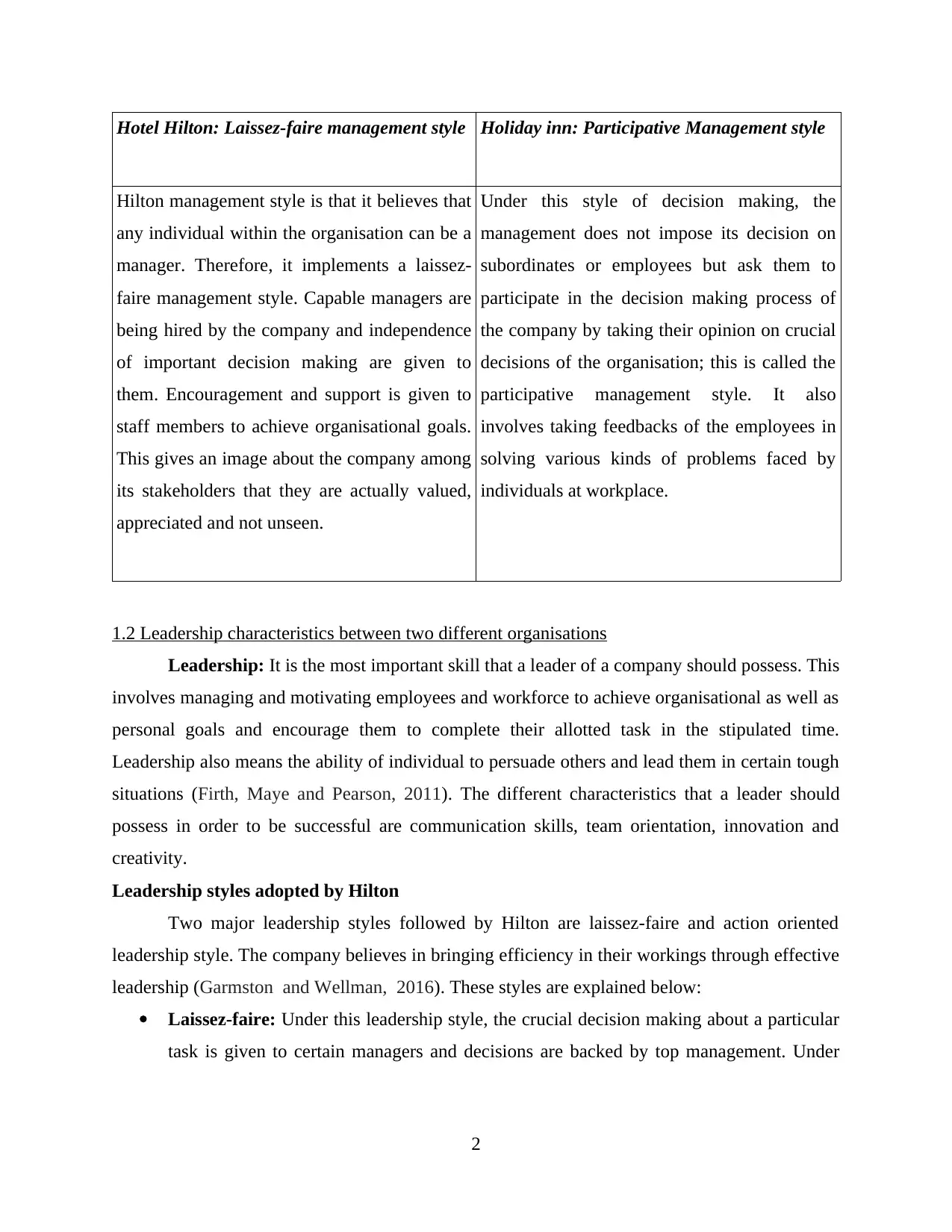
Hotel Hilton: Laissez-faire management style Holiday inn: Participative Management style
Hilton management style is that it believes that
any individual within the organisation can be a
manager. Therefore, it implements a laissez-
faire management style. Capable managers are
being hired by the company and independence
of important decision making are given to
them. Encouragement and support is given to
staff members to achieve organisational goals.
This gives an image about the company among
its stakeholders that they are actually valued,
appreciated and not unseen.
Under this style of decision making, the
management does not impose its decision on
subordinates or employees but ask them to
participate in the decision making process of
the company by taking their opinion on crucial
decisions of the organisation; this is called the
participative management style. It also
involves taking feedbacks of the employees in
solving various kinds of problems faced by
individuals at workplace.
1.2 Leadership characteristics between two different organisations
Leadership: It is the most important skill that a leader of a company should possess. This
involves managing and motivating employees and workforce to achieve organisational as well as
personal goals and encourage them to complete their allotted task in the stipulated time.
Leadership also means the ability of individual to persuade others and lead them in certain tough
situations (Firth, Maye and Pearson, 2011). The different characteristics that a leader should
possess in order to be successful are communication skills, team orientation, innovation and
creativity.
Leadership styles adopted by Hilton
Two major leadership styles followed by Hilton are laissez-faire and action oriented
leadership style. The company believes in bringing efficiency in their workings through effective
leadership (Garmston and Wellman, 2016). These styles are explained below:
Laissez-faire: Under this leadership style, the crucial decision making about a particular
task is given to certain managers and decisions are backed by top management. Under
2
Hilton management style is that it believes that
any individual within the organisation can be a
manager. Therefore, it implements a laissez-
faire management style. Capable managers are
being hired by the company and independence
of important decision making are given to
them. Encouragement and support is given to
staff members to achieve organisational goals.
This gives an image about the company among
its stakeholders that they are actually valued,
appreciated and not unseen.
Under this style of decision making, the
management does not impose its decision on
subordinates or employees but ask them to
participate in the decision making process of
the company by taking their opinion on crucial
decisions of the organisation; this is called the
participative management style. It also
involves taking feedbacks of the employees in
solving various kinds of problems faced by
individuals at workplace.
1.2 Leadership characteristics between two different organisations
Leadership: It is the most important skill that a leader of a company should possess. This
involves managing and motivating employees and workforce to achieve organisational as well as
personal goals and encourage them to complete their allotted task in the stipulated time.
Leadership also means the ability of individual to persuade others and lead them in certain tough
situations (Firth, Maye and Pearson, 2011). The different characteristics that a leader should
possess in order to be successful are communication skills, team orientation, innovation and
creativity.
Leadership styles adopted by Hilton
Two major leadership styles followed by Hilton are laissez-faire and action oriented
leadership style. The company believes in bringing efficiency in their workings through effective
leadership (Garmston and Wellman, 2016). These styles are explained below:
Laissez-faire: Under this leadership style, the crucial decision making about a particular
task is given to certain managers and decisions are backed by top management. Under
2
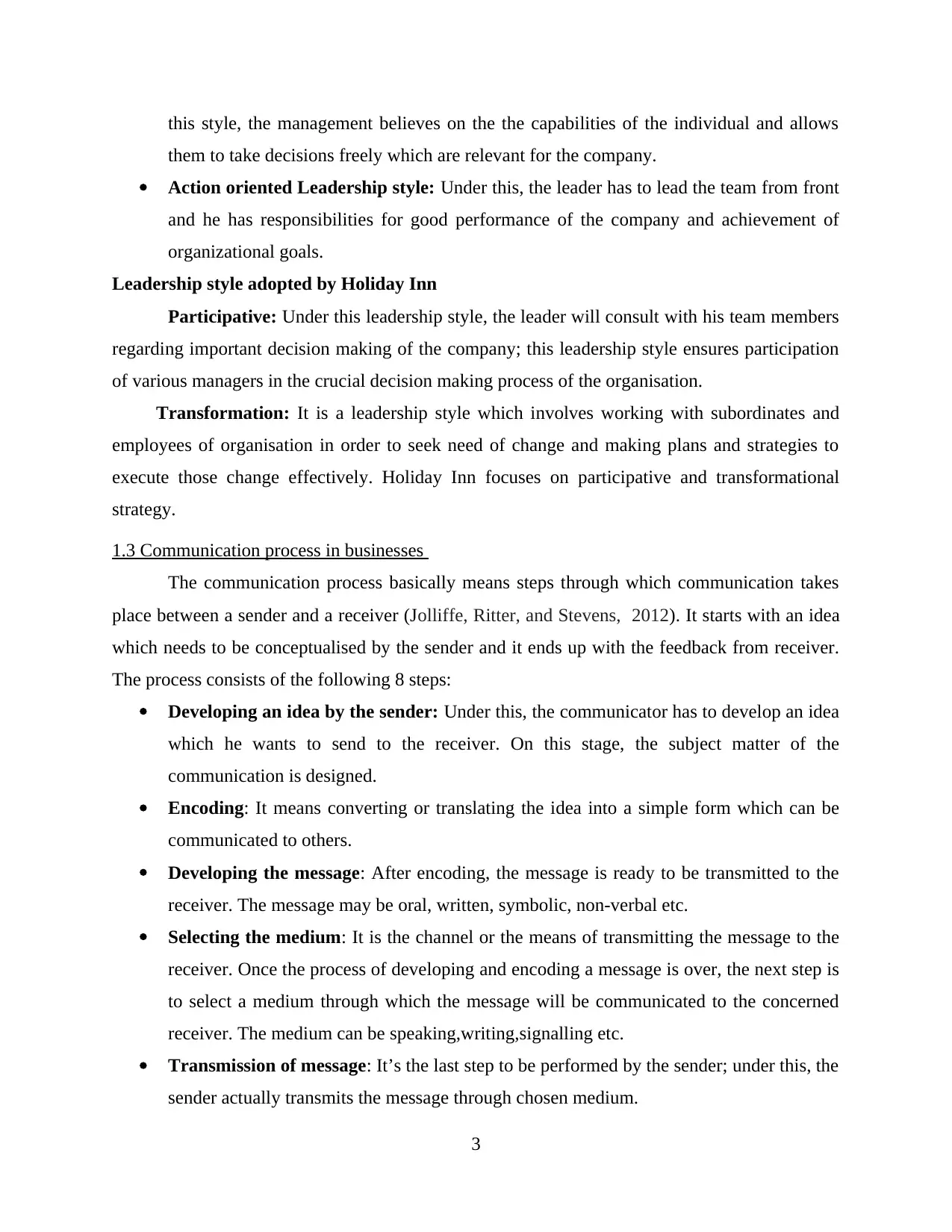
this style, the management believes on the the capabilities of the individual and allows
them to take decisions freely which are relevant for the company.
Action oriented Leadership style: Under this, the leader has to lead the team from front
and he has responsibilities for good performance of the company and achievement of
organizational goals.
Leadership style adopted by Holiday Inn
Participative: Under this leadership style, the leader will consult with his team members
regarding important decision making of the company; this leadership style ensures participation
of various managers in the crucial decision making process of the organisation.
Transformation: It is a leadership style which involves working with subordinates and
employees of organisation in order to seek need of change and making plans and strategies to
execute those change effectively. Holiday Inn focuses on participative and transformational
strategy.
1.3 Communication process in businesses
The communication process basically means steps through which communication takes
place between a sender and a receiver (Jolliffe, Ritter, and Stevens, 2012). It starts with an idea
which needs to be conceptualised by the sender and it ends up with the feedback from receiver.
The process consists of the following 8 steps:
Developing an idea by the sender: Under this, the communicator has to develop an idea
which he wants to send to the receiver. On this stage, the subject matter of the
communication is designed.
Encoding: It means converting or translating the idea into a simple form which can be
communicated to others.
Developing the message: After encoding, the message is ready to be transmitted to the
receiver. The message may be oral, written, symbolic, non-verbal etc.
Selecting the medium: It is the channel or the means of transmitting the message to the
receiver. Once the process of developing and encoding a message is over, the next step is
to select a medium through which the message will be communicated to the concerned
receiver. The medium can be speaking,writing,signalling etc.
Transmission of message: It’s the last step to be performed by the sender; under this, the
sender actually transmits the message through chosen medium.
3
them to take decisions freely which are relevant for the company.
Action oriented Leadership style: Under this, the leader has to lead the team from front
and he has responsibilities for good performance of the company and achievement of
organizational goals.
Leadership style adopted by Holiday Inn
Participative: Under this leadership style, the leader will consult with his team members
regarding important decision making of the company; this leadership style ensures participation
of various managers in the crucial decision making process of the organisation.
Transformation: It is a leadership style which involves working with subordinates and
employees of organisation in order to seek need of change and making plans and strategies to
execute those change effectively. Holiday Inn focuses on participative and transformational
strategy.
1.3 Communication process in businesses
The communication process basically means steps through which communication takes
place between a sender and a receiver (Jolliffe, Ritter, and Stevens, 2012). It starts with an idea
which needs to be conceptualised by the sender and it ends up with the feedback from receiver.
The process consists of the following 8 steps:
Developing an idea by the sender: Under this, the communicator has to develop an idea
which he wants to send to the receiver. On this stage, the subject matter of the
communication is designed.
Encoding: It means converting or translating the idea into a simple form which can be
communicated to others.
Developing the message: After encoding, the message is ready to be transmitted to the
receiver. The message may be oral, written, symbolic, non-verbal etc.
Selecting the medium: It is the channel or the means of transmitting the message to the
receiver. Once the process of developing and encoding a message is over, the next step is
to select a medium through which the message will be communicated to the concerned
receiver. The medium can be speaking,writing,signalling etc.
Transmission of message: It’s the last step to be performed by the sender; under this, the
sender actually transmits the message through chosen medium.
3
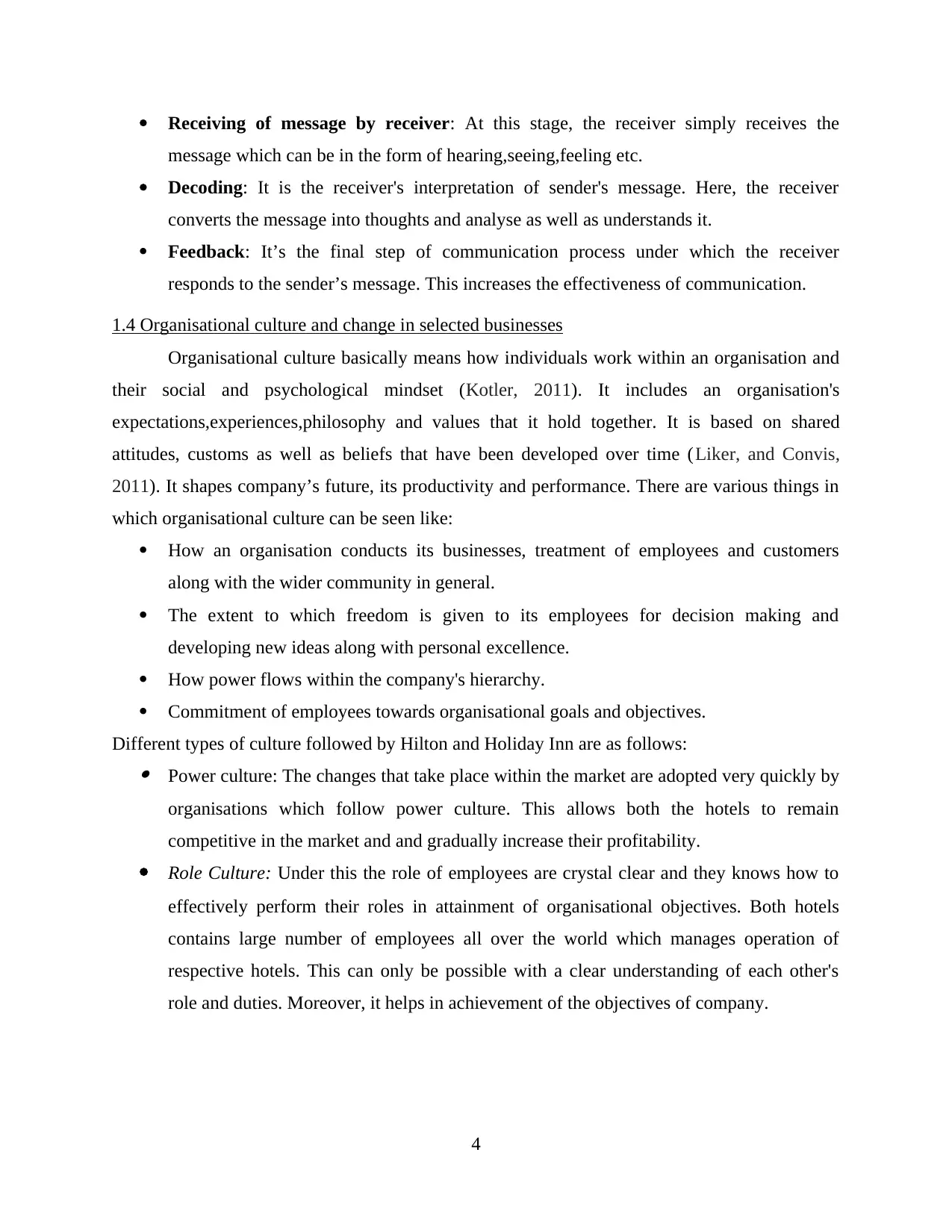
Receiving of message by receiver: At this stage, the receiver simply receives the
message which can be in the form of hearing,seeing,feeling etc.
Decoding: It is the receiver's interpretation of sender's message. Here, the receiver
converts the message into thoughts and analyse as well as understands it.
Feedback: It’s the final step of communication process under which the receiver
responds to the sender’s message. This increases the effectiveness of communication.
1.4 Organisational culture and change in selected businesses
Organisational culture basically means how individuals work within an organisation and
their social and psychological mindset (Kotler, 2011). It includes an organisation's
expectations,experiences,philosophy and values that it hold together. It is based on shared
attitudes, customs as well as beliefs that have been developed over time (Liker, and Convis,
2011). It shapes company’s future, its productivity and performance. There are various things in
which organisational culture can be seen like:
How an organisation conducts its businesses, treatment of employees and customers
along with the wider community in general.
The extent to which freedom is given to its employees for decision making and
developing new ideas along with personal excellence.
How power flows within the company's hierarchy.
Commitment of employees towards organisational goals and objectives.
Different types of culture followed by Hilton and Holiday Inn are as follows: Power culture: The changes that take place within the market are adopted very quickly by
organisations which follow power culture. This allows both the hotels to remain
competitive in the market and and gradually increase their profitability.
Role Culture: Under this the role of employees are crystal clear and they knows how to
effectively perform their roles in attainment of organisational objectives. Both hotels
contains large number of employees all over the world which manages operation of
respective hotels. This can only be possible with a clear understanding of each other's
role and duties. Moreover, it helps in achievement of the objectives of company.
4
message which can be in the form of hearing,seeing,feeling etc.
Decoding: It is the receiver's interpretation of sender's message. Here, the receiver
converts the message into thoughts and analyse as well as understands it.
Feedback: It’s the final step of communication process under which the receiver
responds to the sender’s message. This increases the effectiveness of communication.
1.4 Organisational culture and change in selected businesses
Organisational culture basically means how individuals work within an organisation and
their social and psychological mindset (Kotler, 2011). It includes an organisation's
expectations,experiences,philosophy and values that it hold together. It is based on shared
attitudes, customs as well as beliefs that have been developed over time (Liker, and Convis,
2011). It shapes company’s future, its productivity and performance. There are various things in
which organisational culture can be seen like:
How an organisation conducts its businesses, treatment of employees and customers
along with the wider community in general.
The extent to which freedom is given to its employees for decision making and
developing new ideas along with personal excellence.
How power flows within the company's hierarchy.
Commitment of employees towards organisational goals and objectives.
Different types of culture followed by Hilton and Holiday Inn are as follows: Power culture: The changes that take place within the market are adopted very quickly by
organisations which follow power culture. This allows both the hotels to remain
competitive in the market and and gradually increase their profitability.
Role Culture: Under this the role of employees are crystal clear and they knows how to
effectively perform their roles in attainment of organisational objectives. Both hotels
contains large number of employees all over the world which manages operation of
respective hotels. This can only be possible with a clear understanding of each other's
role and duties. Moreover, it helps in achievement of the objectives of company.
4
Paraphrase This Document
Need a fresh take? Get an instant paraphrase of this document with our AI Paraphraser
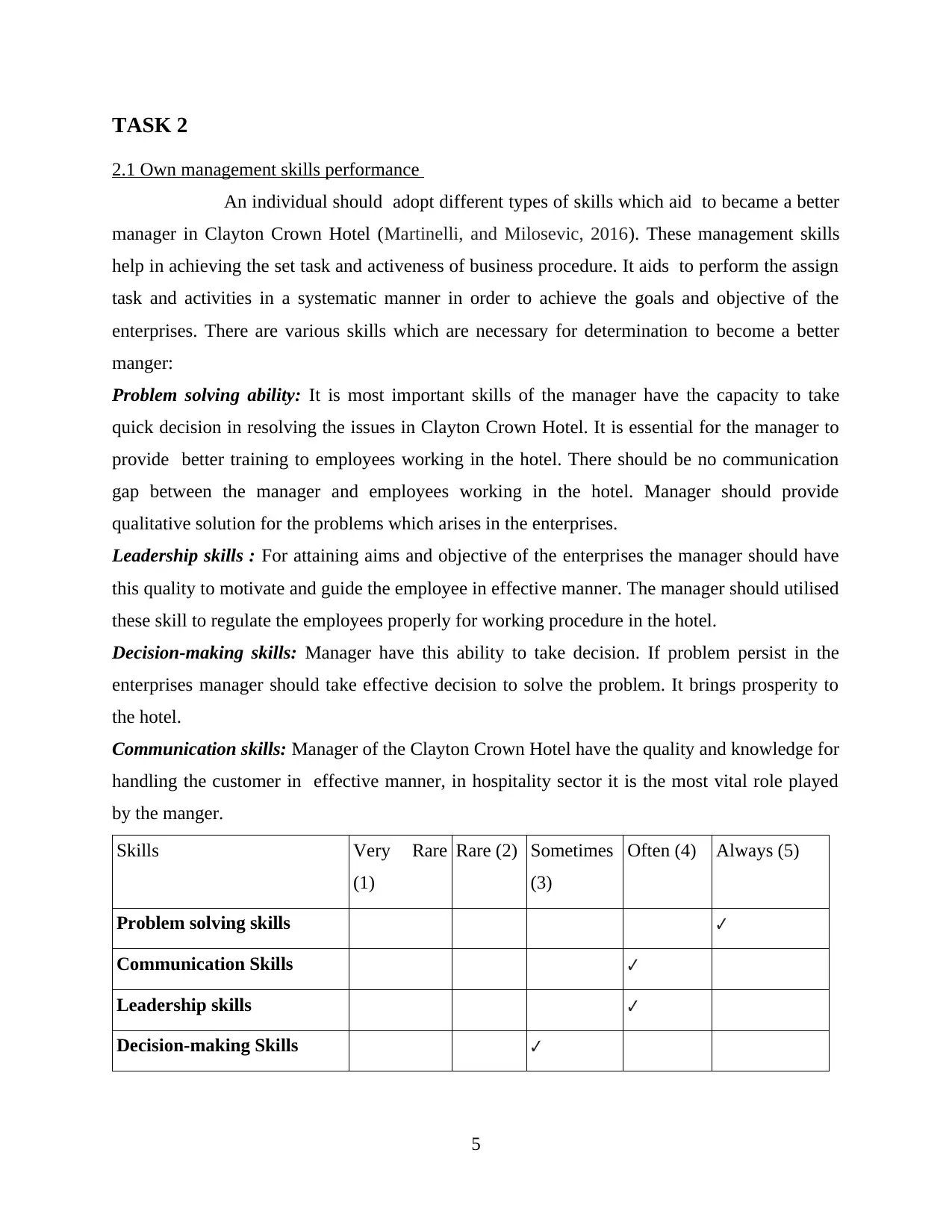
TASK 2
2.1 Own management skills performance
An individual should adopt different types of skills which aid to became a better
manager in Clayton Crown Hotel (Martinelli, and Milosevic, 2016). These management skills
help in achieving the set task and activeness of business procedure. It aids to perform the assign
task and activities in a systematic manner in order to achieve the goals and objective of the
enterprises. There are various skills which are necessary for determination to become a better
manger:
Problem solving ability: It is most important skills of the manager have the capacity to take
quick decision in resolving the issues in Clayton Crown Hotel. It is essential for the manager to
provide better training to employees working in the hotel. There should be no communication
gap between the manager and employees working in the hotel. Manager should provide
qualitative solution for the problems which arises in the enterprises.
Leadership skills : For attaining aims and objective of the enterprises the manager should have
this quality to motivate and guide the employee in effective manner. The manager should utilised
these skill to regulate the employees properly for working procedure in the hotel.
Decision-making skills: Manager have this ability to take decision. If problem persist in the
enterprises manager should take effective decision to solve the problem. It brings prosperity to
the hotel.
Communication skills: Manager of the Clayton Crown Hotel have the quality and knowledge for
handling the customer in effective manner, in hospitality sector it is the most vital role played
by the manger.
Skills Very Rare
(1)
Rare (2) Sometimes
(3)
Often (4) Always (5)
Problem solving skills ✔
Communication Skills ✔
Leadership skills ✔
Decision-making Skills ✔
5
2.1 Own management skills performance
An individual should adopt different types of skills which aid to became a better
manager in Clayton Crown Hotel (Martinelli, and Milosevic, 2016). These management skills
help in achieving the set task and activeness of business procedure. It aids to perform the assign
task and activities in a systematic manner in order to achieve the goals and objective of the
enterprises. There are various skills which are necessary for determination to become a better
manger:
Problem solving ability: It is most important skills of the manager have the capacity to take
quick decision in resolving the issues in Clayton Crown Hotel. It is essential for the manager to
provide better training to employees working in the hotel. There should be no communication
gap between the manager and employees working in the hotel. Manager should provide
qualitative solution for the problems which arises in the enterprises.
Leadership skills : For attaining aims and objective of the enterprises the manager should have
this quality to motivate and guide the employee in effective manner. The manager should utilised
these skill to regulate the employees properly for working procedure in the hotel.
Decision-making skills: Manager have this ability to take decision. If problem persist in the
enterprises manager should take effective decision to solve the problem. It brings prosperity to
the hotel.
Communication skills: Manager of the Clayton Crown Hotel have the quality and knowledge for
handling the customer in effective manner, in hospitality sector it is the most vital role played
by the manger.
Skills Very Rare
(1)
Rare (2) Sometimes
(3)
Often (4) Always (5)
Problem solving skills ✔
Communication Skills ✔
Leadership skills ✔
Decision-making Skills ✔
5
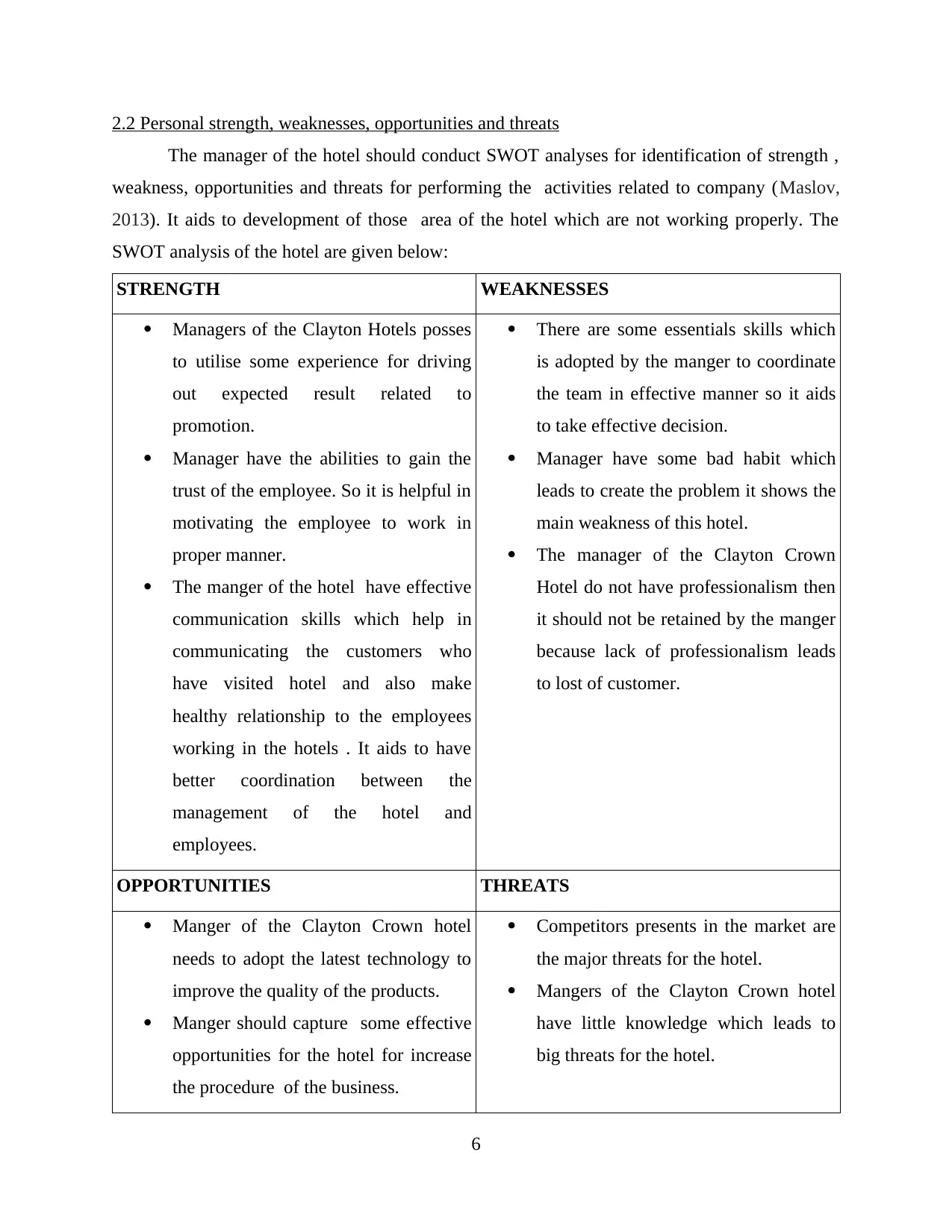
2.2 Personal strength, weaknesses, opportunities and threats
The manager of the hotel should conduct SWOT analyses for identification of strength ,
weakness, opportunities and threats for performing the activities related to company (Maslov,
2013). It aids to development of those area of the hotel which are not working properly. The
SWOT analysis of the hotel are given below:
STRENGTH WEAKNESSES
Managers of the Clayton Hotels posses
to utilise some experience for driving
out expected result related to
promotion.
Manager have the abilities to gain the
trust of the employee. So it is helpful in
motivating the employee to work in
proper manner.
The manger of the hotel have effective
communication skills which help in
communicating the customers who
have visited hotel and also make
healthy relationship to the employees
working in the hotels . It aids to have
better coordination between the
management of the hotel and
employees.
There are some essentials skills which
is adopted by the manger to coordinate
the team in effective manner so it aids
to take effective decision.
Manager have some bad habit which
leads to create the problem it shows the
main weakness of this hotel.
The manager of the Clayton Crown
Hotel do not have professionalism then
it should not be retained by the manger
because lack of professionalism leads
to lost of customer.
OPPORTUNITIES THREATS
Manger of the Clayton Crown hotel
needs to adopt the latest technology to
improve the quality of the products.
Manger should capture some effective
opportunities for the hotel for increase
the procedure of the business.
Competitors presents in the market are
the major threats for the hotel.
Mangers of the Clayton Crown hotel
have little knowledge which leads to
big threats for the hotel.
6
The manager of the hotel should conduct SWOT analyses for identification of strength ,
weakness, opportunities and threats for performing the activities related to company (Maslov,
2013). It aids to development of those area of the hotel which are not working properly. The
SWOT analysis of the hotel are given below:
STRENGTH WEAKNESSES
Managers of the Clayton Hotels posses
to utilise some experience for driving
out expected result related to
promotion.
Manager have the abilities to gain the
trust of the employee. So it is helpful in
motivating the employee to work in
proper manner.
The manger of the hotel have effective
communication skills which help in
communicating the customers who
have visited hotel and also make
healthy relationship to the employees
working in the hotels . It aids to have
better coordination between the
management of the hotel and
employees.
There are some essentials skills which
is adopted by the manger to coordinate
the team in effective manner so it aids
to take effective decision.
Manager have some bad habit which
leads to create the problem it shows the
main weakness of this hotel.
The manager of the Clayton Crown
Hotel do not have professionalism then
it should not be retained by the manger
because lack of professionalism leads
to lost of customer.
OPPORTUNITIES THREATS
Manger of the Clayton Crown hotel
needs to adopt the latest technology to
improve the quality of the products.
Manger should capture some effective
opportunities for the hotel for increase
the procedure of the business.
Competitors presents in the market are
the major threats for the hotel.
Mangers of the Clayton Crown hotel
have little knowledge which leads to
big threats for the hotel.
6
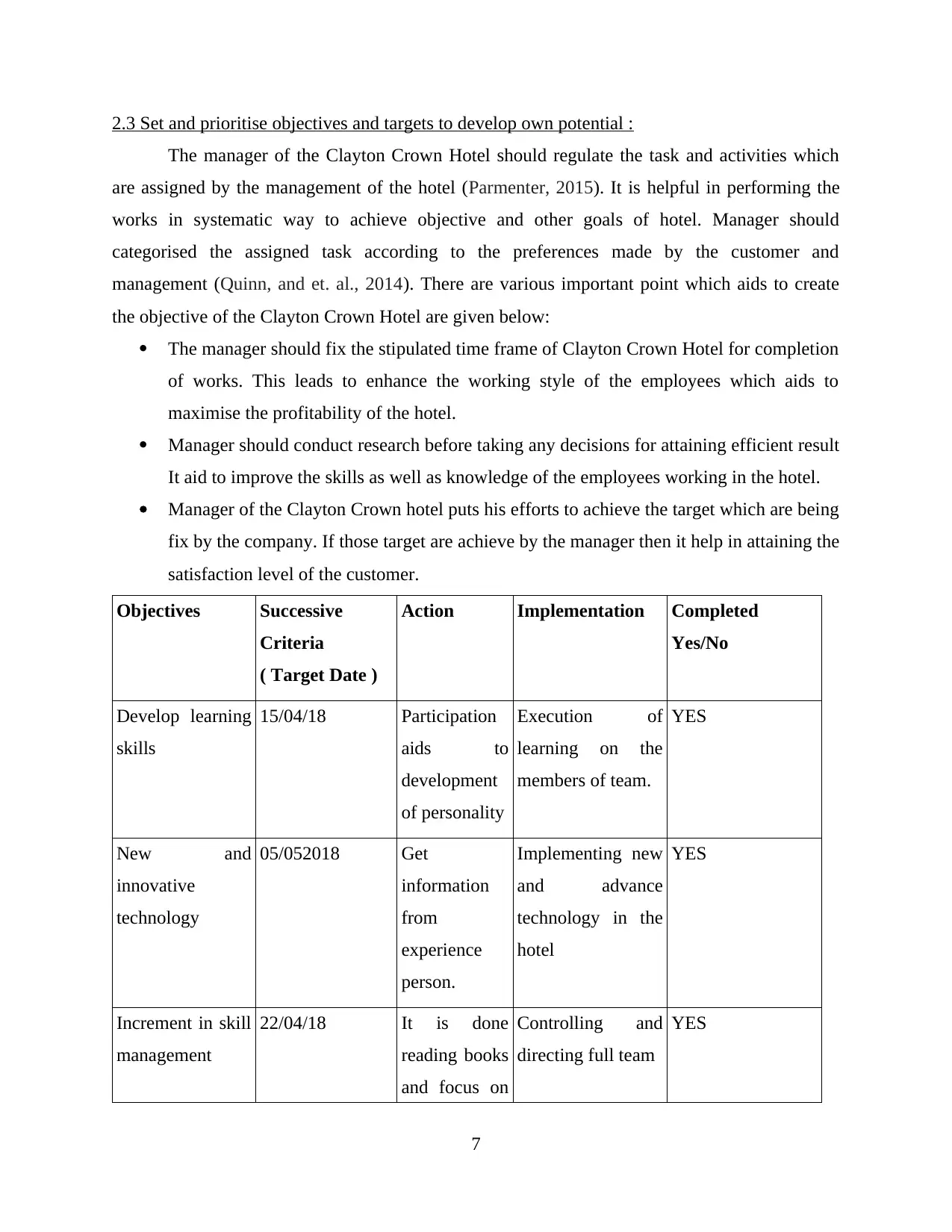
2.3 Set and prioritise objectives and targets to develop own potential :
The manager of the Clayton Crown Hotel should regulate the task and activities which
are assigned by the management of the hotel (Parmenter, 2015). It is helpful in performing the
works in systematic way to achieve objective and other goals of hotel. Manager should
categorised the assigned task according to the preferences made by the customer and
management (Quinn, and et. al., 2014). There are various important point which aids to create
the objective of the Clayton Crown Hotel are given below:
The manager should fix the stipulated time frame of Clayton Crown Hotel for completion
of works. This leads to enhance the working style of the employees which aids to
maximise the profitability of the hotel.
Manager should conduct research before taking any decisions for attaining efficient result
It aid to improve the skills as well as knowledge of the employees working in the hotel.
Manager of the Clayton Crown hotel puts his efforts to achieve the target which are being
fix by the company. If those target are achieve by the manager then it help in attaining the
satisfaction level of the customer.
Objectives Successive
Criteria
( Target Date )
Action Implementation Completed
Yes/No
Develop learning
skills
15/04/18 Participation
aids to
development
of personality
Execution of
learning on the
members of team.
YES
New and
innovative
technology
05/052018 Get
information
from
experience
person.
Implementing new
and advance
technology in the
hotel
YES
Increment in skill
management
22/04/18 It is done
reading books
and focus on
Controlling and
directing full team
YES
7
The manager of the Clayton Crown Hotel should regulate the task and activities which
are assigned by the management of the hotel (Parmenter, 2015). It is helpful in performing the
works in systematic way to achieve objective and other goals of hotel. Manager should
categorised the assigned task according to the preferences made by the customer and
management (Quinn, and et. al., 2014). There are various important point which aids to create
the objective of the Clayton Crown Hotel are given below:
The manager should fix the stipulated time frame of Clayton Crown Hotel for completion
of works. This leads to enhance the working style of the employees which aids to
maximise the profitability of the hotel.
Manager should conduct research before taking any decisions for attaining efficient result
It aid to improve the skills as well as knowledge of the employees working in the hotel.
Manager of the Clayton Crown hotel puts his efforts to achieve the target which are being
fix by the company. If those target are achieve by the manager then it help in attaining the
satisfaction level of the customer.
Objectives Successive
Criteria
( Target Date )
Action Implementation Completed
Yes/No
Develop learning
skills
15/04/18 Participation
aids to
development
of personality
Execution of
learning on the
members of team.
YES
New and
innovative
technology
05/052018 Get
information
from
experience
person.
Implementing new
and advance
technology in the
hotel
YES
Increment in skill
management
22/04/18 It is done
reading books
and focus on
Controlling and
directing full team
YES
7
Secure Best Marks with AI Grader
Need help grading? Try our AI Grader for instant feedback on your assignments.
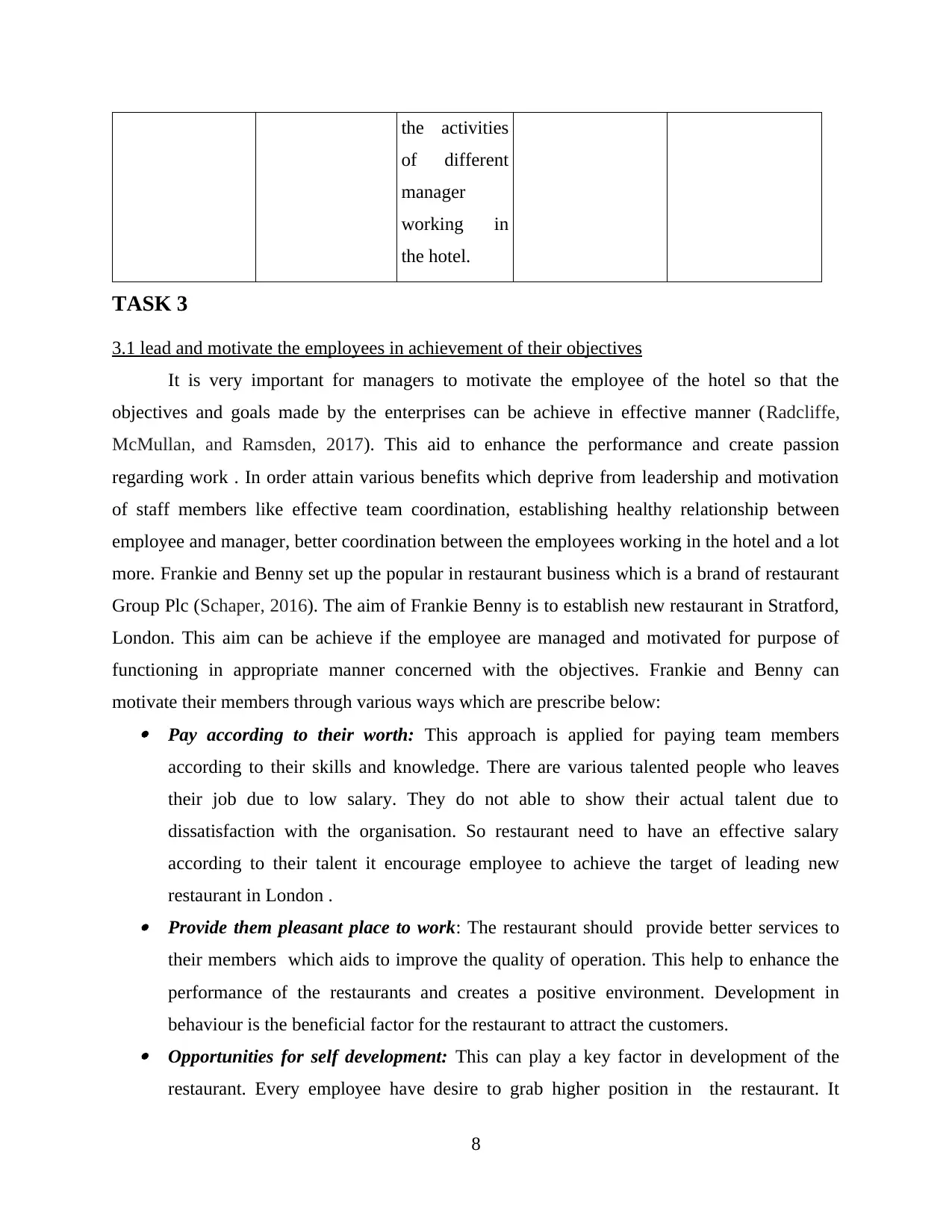
the activities
of different
manager
working in
the hotel.
TASK 3
3.1 lead and motivate the employees in achievement of their objectives
It is very important for managers to motivate the employee of the hotel so that the
objectives and goals made by the enterprises can be achieve in effective manner (Radcliffe,
McMullan, and Ramsden, 2017). This aid to enhance the performance and create passion
regarding work . In order attain various benefits which deprive from leadership and motivation
of staff members like effective team coordination, establishing healthy relationship between
employee and manager, better coordination between the employees working in the hotel and a lot
more. Frankie and Benny set up the popular in restaurant business which is a brand of restaurant
Group Plc (Schaper, 2016). The aim of Frankie Benny is to establish new restaurant in Stratford,
London. This aim can be achieve if the employee are managed and motivated for purpose of
functioning in appropriate manner concerned with the objectives. Frankie and Benny can
motivate their members through various ways which are prescribe below: Pay according to their worth: This approach is applied for paying team members
according to their skills and knowledge. There are various talented people who leaves
their job due to low salary. They do not able to show their actual talent due to
dissatisfaction with the organisation. So restaurant need to have an effective salary
according to their talent it encourage employee to achieve the target of leading new
restaurant in London . Provide them pleasant place to work: The restaurant should provide better services to
their members which aids to improve the quality of operation. This help to enhance the
performance of the restaurants and creates a positive environment. Development in
behaviour is the beneficial factor for the restaurant to attract the customers. Opportunities for self development: This can play a key factor in development of the
restaurant. Every employee have desire to grab higher position in the restaurant. It
8
of different
manager
working in
the hotel.
TASK 3
3.1 lead and motivate the employees in achievement of their objectives
It is very important for managers to motivate the employee of the hotel so that the
objectives and goals made by the enterprises can be achieve in effective manner (Radcliffe,
McMullan, and Ramsden, 2017). This aid to enhance the performance and create passion
regarding work . In order attain various benefits which deprive from leadership and motivation
of staff members like effective team coordination, establishing healthy relationship between
employee and manager, better coordination between the employees working in the hotel and a lot
more. Frankie and Benny set up the popular in restaurant business which is a brand of restaurant
Group Plc (Schaper, 2016). The aim of Frankie Benny is to establish new restaurant in Stratford,
London. This aim can be achieve if the employee are managed and motivated for purpose of
functioning in appropriate manner concerned with the objectives. Frankie and Benny can
motivate their members through various ways which are prescribe below: Pay according to their worth: This approach is applied for paying team members
according to their skills and knowledge. There are various talented people who leaves
their job due to low salary. They do not able to show their actual talent due to
dissatisfaction with the organisation. So restaurant need to have an effective salary
according to their talent it encourage employee to achieve the target of leading new
restaurant in London . Provide them pleasant place to work: The restaurant should provide better services to
their members which aids to improve the quality of operation. This help to enhance the
performance of the restaurants and creates a positive environment. Development in
behaviour is the beneficial factor for the restaurant to attract the customers. Opportunities for self development: This can play a key factor in development of the
restaurant. Every employee have desire to grab higher position in the restaurant. It
8
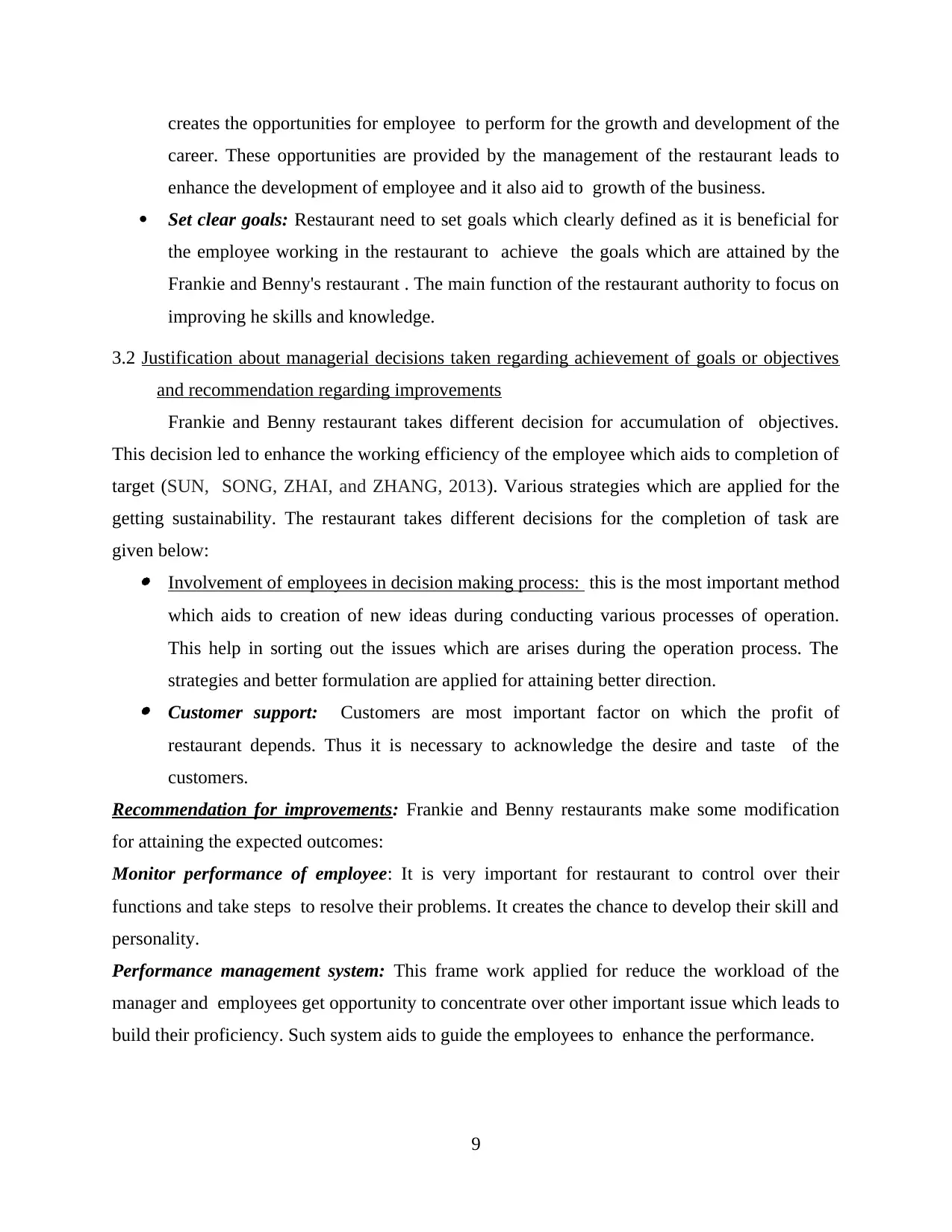
creates the opportunities for employee to perform for the growth and development of the
career. These opportunities are provided by the management of the restaurant leads to
enhance the development of employee and it also aid to growth of the business.
Set clear goals: Restaurant need to set goals which clearly defined as it is beneficial for
the employee working in the restaurant to achieve the goals which are attained by the
Frankie and Benny's restaurant . The main function of the restaurant authority to focus on
improving he skills and knowledge.
3.2 Justification about managerial decisions taken regarding achievement of goals or objectives
and recommendation regarding improvements
Frankie and Benny restaurant takes different decision for accumulation of objectives.
This decision led to enhance the working efficiency of the employee which aids to completion of
target (SUN, SONG, ZHAI, and ZHANG, 2013). Various strategies which are applied for the
getting sustainability. The restaurant takes different decisions for the completion of task are
given below: Involvement of employees in decision making process: this is the most important method
which aids to creation of new ideas during conducting various processes of operation.
This help in sorting out the issues which are arises during the operation process. The
strategies and better formulation are applied for attaining better direction. Customer support: Customers are most important factor on which the profit of
restaurant depends. Thus it is necessary to acknowledge the desire and taste of the
customers.
Recommendation for improvements: Frankie and Benny restaurants make some modification
for attaining the expected outcomes:
Monitor performance of employee: It is very important for restaurant to control over their
functions and take steps to resolve their problems. It creates the chance to develop their skill and
personality.
Performance management system: This frame work applied for reduce the workload of the
manager and employees get opportunity to concentrate over other important issue which leads to
build their proficiency. Such system aids to guide the employees to enhance the performance.
9
career. These opportunities are provided by the management of the restaurant leads to
enhance the development of employee and it also aid to growth of the business.
Set clear goals: Restaurant need to set goals which clearly defined as it is beneficial for
the employee working in the restaurant to achieve the goals which are attained by the
Frankie and Benny's restaurant . The main function of the restaurant authority to focus on
improving he skills and knowledge.
3.2 Justification about managerial decisions taken regarding achievement of goals or objectives
and recommendation regarding improvements
Frankie and Benny restaurant takes different decision for accumulation of objectives.
This decision led to enhance the working efficiency of the employee which aids to completion of
target (SUN, SONG, ZHAI, and ZHANG, 2013). Various strategies which are applied for the
getting sustainability. The restaurant takes different decisions for the completion of task are
given below: Involvement of employees in decision making process: this is the most important method
which aids to creation of new ideas during conducting various processes of operation.
This help in sorting out the issues which are arises during the operation process. The
strategies and better formulation are applied for attaining better direction. Customer support: Customers are most important factor on which the profit of
restaurant depends. Thus it is necessary to acknowledge the desire and taste of the
customers.
Recommendation for improvements: Frankie and Benny restaurants make some modification
for attaining the expected outcomes:
Monitor performance of employee: It is very important for restaurant to control over their
functions and take steps to resolve their problems. It creates the chance to develop their skill and
personality.
Performance management system: This frame work applied for reduce the workload of the
manager and employees get opportunity to concentrate over other important issue which leads to
build their proficiency. Such system aids to guide the employees to enhance the performance.
9
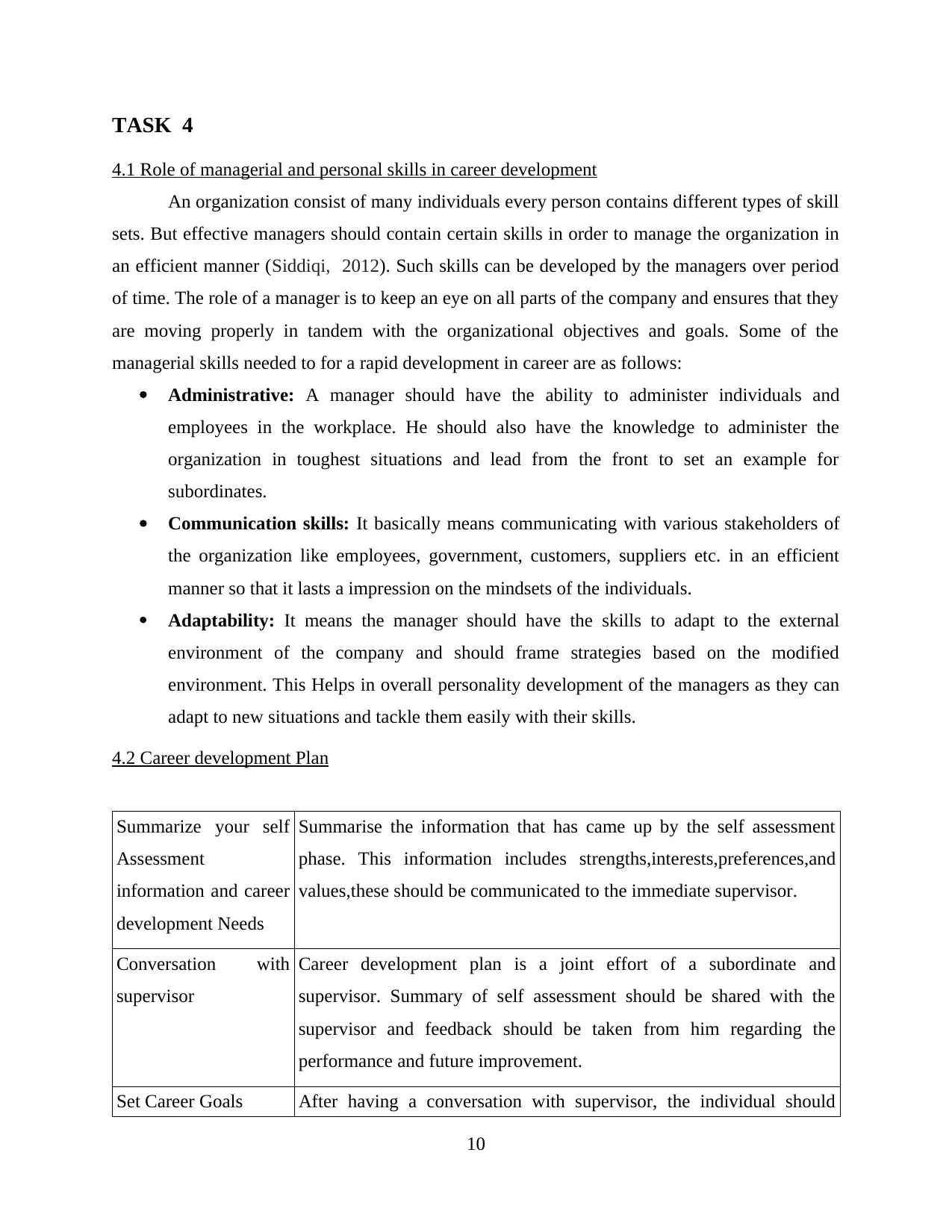
TASK 4
4.1 Role of managerial and personal skills in career development
An organization consist of many individuals every person contains different types of skill
sets. But effective managers should contain certain skills in order to manage the organization in
an efficient manner (Siddiqi, 2012). Such skills can be developed by the managers over period
of time. The role of a manager is to keep an eye on all parts of the company and ensures that they
are moving properly in tandem with the organizational objectives and goals. Some of the
managerial skills needed to for a rapid development in career are as follows:
Administrative: A manager should have the ability to administer individuals and
employees in the workplace. He should also have the knowledge to administer the
organization in toughest situations and lead from the front to set an example for
subordinates.
Communication skills: It basically means communicating with various stakeholders of
the organization like employees, government, customers, suppliers etc. in an efficient
manner so that it lasts a impression on the mindsets of the individuals.
Adaptability: It means the manager should have the skills to adapt to the external
environment of the company and should frame strategies based on the modified
environment. This Helps in overall personality development of the managers as they can
adapt to new situations and tackle them easily with their skills.
4.2 Career development Plan
Summarize your self
Assessment
information and career
development Needs
Summarise the information that has came up by the self assessment
phase. This information includes strengths,interests,preferences,and
values,these should be communicated to the immediate supervisor.
Conversation with
supervisor
Career development plan is a joint effort of a subordinate and
supervisor. Summary of self assessment should be shared with the
supervisor and feedback should be taken from him regarding the
performance and future improvement.
Set Career Goals After having a conversation with supervisor, the individual should
10
4.1 Role of managerial and personal skills in career development
An organization consist of many individuals every person contains different types of skill
sets. But effective managers should contain certain skills in order to manage the organization in
an efficient manner (Siddiqi, 2012). Such skills can be developed by the managers over period
of time. The role of a manager is to keep an eye on all parts of the company and ensures that they
are moving properly in tandem with the organizational objectives and goals. Some of the
managerial skills needed to for a rapid development in career are as follows:
Administrative: A manager should have the ability to administer individuals and
employees in the workplace. He should also have the knowledge to administer the
organization in toughest situations and lead from the front to set an example for
subordinates.
Communication skills: It basically means communicating with various stakeholders of
the organization like employees, government, customers, suppliers etc. in an efficient
manner so that it lasts a impression on the mindsets of the individuals.
Adaptability: It means the manager should have the skills to adapt to the external
environment of the company and should frame strategies based on the modified
environment. This Helps in overall personality development of the managers as they can
adapt to new situations and tackle them easily with their skills.
4.2 Career development Plan
Summarize your self
Assessment
information and career
development Needs
Summarise the information that has came up by the self assessment
phase. This information includes strengths,interests,preferences,and
values,these should be communicated to the immediate supervisor.
Conversation with
supervisor
Career development plan is a joint effort of a subordinate and
supervisor. Summary of self assessment should be shared with the
supervisor and feedback should be taken from him regarding the
performance and future improvement.
Set Career Goals After having a conversation with supervisor, the individual should
10
Paraphrase This Document
Need a fresh take? Get an instant paraphrase of this document with our AI Paraphraser
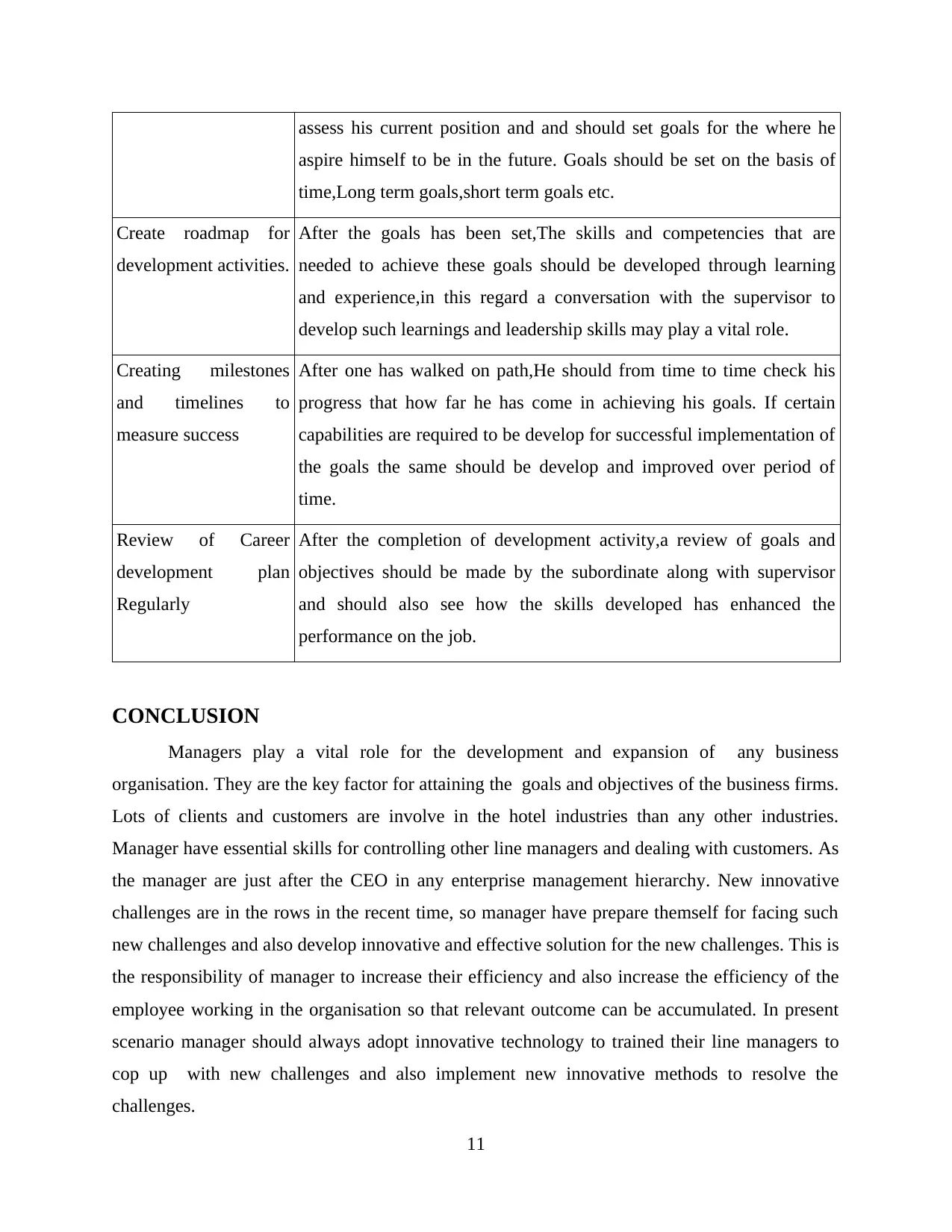
assess his current position and and should set goals for the where he
aspire himself to be in the future. Goals should be set on the basis of
time,Long term goals,short term goals etc.
Create roadmap for
development activities.
After the goals has been set,The skills and competencies that are
needed to achieve these goals should be developed through learning
and experience,in this regard a conversation with the supervisor to
develop such learnings and leadership skills may play a vital role.
Creating milestones
and timelines to
measure success
After one has walked on path,He should from time to time check his
progress that how far he has come in achieving his goals. If certain
capabilities are required to be develop for successful implementation of
the goals the same should be develop and improved over period of
time.
Review of Career
development plan
Regularly
After the completion of development activity,a review of goals and
objectives should be made by the subordinate along with supervisor
and should also see how the skills developed has enhanced the
performance on the job.
CONCLUSION
Managers play a vital role for the development and expansion of any business
organisation. They are the key factor for attaining the goals and objectives of the business firms.
Lots of clients and customers are involve in the hotel industries than any other industries.
Manager have essential skills for controlling other line managers and dealing with customers. As
the manager are just after the CEO in any enterprise management hierarchy. New innovative
challenges are in the rows in the recent time, so manager have prepare themself for facing such
new challenges and also develop innovative and effective solution for the new challenges. This is
the responsibility of manager to increase their efficiency and also increase the efficiency of the
employee working in the organisation so that relevant outcome can be accumulated. In present
scenario manager should always adopt innovative technology to trained their line managers to
cop up with new challenges and also implement new innovative methods to resolve the
challenges.
11
aspire himself to be in the future. Goals should be set on the basis of
time,Long term goals,short term goals etc.
Create roadmap for
development activities.
After the goals has been set,The skills and competencies that are
needed to achieve these goals should be developed through learning
and experience,in this regard a conversation with the supervisor to
develop such learnings and leadership skills may play a vital role.
Creating milestones
and timelines to
measure success
After one has walked on path,He should from time to time check his
progress that how far he has come in achieving his goals. If certain
capabilities are required to be develop for successful implementation of
the goals the same should be develop and improved over period of
time.
Review of Career
development plan
Regularly
After the completion of development activity,a review of goals and
objectives should be made by the subordinate along with supervisor
and should also see how the skills developed has enhanced the
performance on the job.
CONCLUSION
Managers play a vital role for the development and expansion of any business
organisation. They are the key factor for attaining the goals and objectives of the business firms.
Lots of clients and customers are involve in the hotel industries than any other industries.
Manager have essential skills for controlling other line managers and dealing with customers. As
the manager are just after the CEO in any enterprise management hierarchy. New innovative
challenges are in the rows in the recent time, so manager have prepare themself for facing such
new challenges and also develop innovative and effective solution for the new challenges. This is
the responsibility of manager to increase their efficiency and also increase the efficiency of the
employee working in the organisation so that relevant outcome can be accumulated. In present
scenario manager should always adopt innovative technology to trained their line managers to
cop up with new challenges and also implement new innovative methods to resolve the
challenges.
11
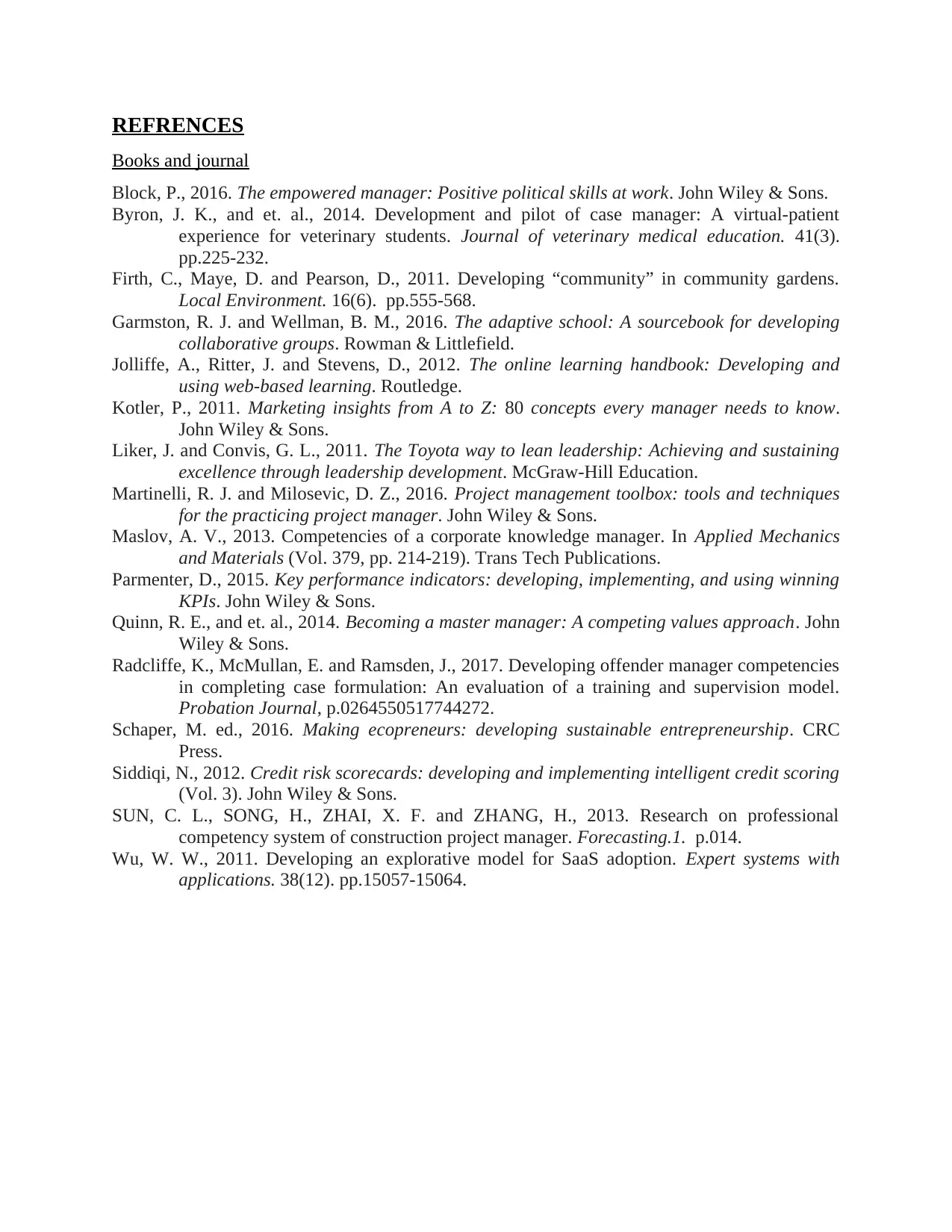
REFRENCES
Books and journal
Block, P., 2016. The empowered manager: Positive political skills at work. John Wiley & Sons.
Byron, J. K., and et. al., 2014. Development and pilot of case manager: A virtual-patient
experience for veterinary students. Journal of veterinary medical education. 41(3).
pp.225-232.
Firth, C., Maye, D. and Pearson, D., 2011. Developing “community” in community gardens.
Local Environment. 16(6). pp.555-568.
Garmston, R. J. and Wellman, B. M., 2016. The adaptive school: A sourcebook for developing
collaborative groups. Rowman & Littlefield.
Jolliffe, A., Ritter, J. and Stevens, D., 2012. The online learning handbook: Developing and
using web-based learning. Routledge.
Kotler, P., 2011. Marketing insights from A to Z: 80 concepts every manager needs to know.
John Wiley & Sons.
Liker, J. and Convis, G. L., 2011. The Toyota way to lean leadership: Achieving and sustaining
excellence through leadership development. McGraw-Hill Education.
Martinelli, R. J. and Milosevic, D. Z., 2016. Project management toolbox: tools and techniques
for the practicing project manager. John Wiley & Sons.
Maslov, A. V., 2013. Competencies of a corporate knowledge manager. In Applied Mechanics
and Materials (Vol. 379, pp. 214-219). Trans Tech Publications.
Parmenter, D., 2015. Key performance indicators: developing, implementing, and using winning
KPIs. John Wiley & Sons.
Quinn, R. E., and et. al., 2014. Becoming a master manager: A competing values approach. John
Wiley & Sons.
Radcliffe, K., McMullan, E. and Ramsden, J., 2017. Developing offender manager competencies
in completing case formulation: An evaluation of a training and supervision model.
Probation Journal, p.0264550517744272.
Schaper, M. ed., 2016. Making ecopreneurs: developing sustainable entrepreneurship. CRC
Press.
Siddiqi, N., 2012. Credit risk scorecards: developing and implementing intelligent credit scoring
(Vol. 3). John Wiley & Sons.
SUN, C. L., SONG, H., ZHAI, X. F. and ZHANG, H., 2013. Research on professional
competency system of construction project manager. Forecasting.1. p.014.
Wu, W. W., 2011. Developing an explorative model for SaaS adoption. Expert systems with
applications. 38(12). pp.15057-15064.
Books and journal
Block, P., 2016. The empowered manager: Positive political skills at work. John Wiley & Sons.
Byron, J. K., and et. al., 2014. Development and pilot of case manager: A virtual-patient
experience for veterinary students. Journal of veterinary medical education. 41(3).
pp.225-232.
Firth, C., Maye, D. and Pearson, D., 2011. Developing “community” in community gardens.
Local Environment. 16(6). pp.555-568.
Garmston, R. J. and Wellman, B. M., 2016. The adaptive school: A sourcebook for developing
collaborative groups. Rowman & Littlefield.
Jolliffe, A., Ritter, J. and Stevens, D., 2012. The online learning handbook: Developing and
using web-based learning. Routledge.
Kotler, P., 2011. Marketing insights from A to Z: 80 concepts every manager needs to know.
John Wiley & Sons.
Liker, J. and Convis, G. L., 2011. The Toyota way to lean leadership: Achieving and sustaining
excellence through leadership development. McGraw-Hill Education.
Martinelli, R. J. and Milosevic, D. Z., 2016. Project management toolbox: tools and techniques
for the practicing project manager. John Wiley & Sons.
Maslov, A. V., 2013. Competencies of a corporate knowledge manager. In Applied Mechanics
and Materials (Vol. 379, pp. 214-219). Trans Tech Publications.
Parmenter, D., 2015. Key performance indicators: developing, implementing, and using winning
KPIs. John Wiley & Sons.
Quinn, R. E., and et. al., 2014. Becoming a master manager: A competing values approach. John
Wiley & Sons.
Radcliffe, K., McMullan, E. and Ramsden, J., 2017. Developing offender manager competencies
in completing case formulation: An evaluation of a training and supervision model.
Probation Journal, p.0264550517744272.
Schaper, M. ed., 2016. Making ecopreneurs: developing sustainable entrepreneurship. CRC
Press.
Siddiqi, N., 2012. Credit risk scorecards: developing and implementing intelligent credit scoring
(Vol. 3). John Wiley & Sons.
SUN, C. L., SONG, H., ZHAI, X. F. and ZHANG, H., 2013. Research on professional
competency system of construction project manager. Forecasting.1. p.014.
Wu, W. W., 2011. Developing an explorative model for SaaS adoption. Expert systems with
applications. 38(12). pp.15057-15064.
1 out of 15
Related Documents
Your All-in-One AI-Powered Toolkit for Academic Success.
+13062052269
info@desklib.com
Available 24*7 on WhatsApp / Email
![[object Object]](/_next/static/media/star-bottom.7253800d.svg)
Unlock your academic potential
© 2024 | Zucol Services PVT LTD | All rights reserved.





